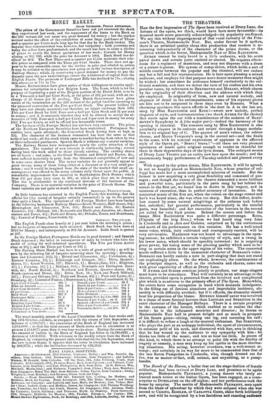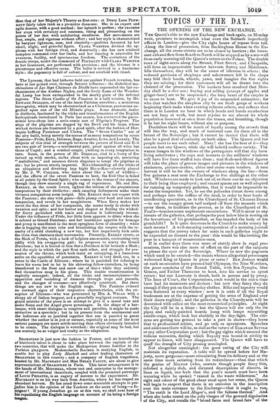THE THEATRES.
HAD the first impression of The Syren been received at Drury Lane, the fortune of the opera, we think, would have been more favourable—its musical merit more generally acknowledged—its popularity confirmed. We say this without disparagement of that vocal curiosity of the Prin- cess's Theatre, Mademoiselle Neu. But, under favour be it spoken, there is an artistical quality about this production that renders it-in- teresting independently of the character of the prima donna, or the question which is the better, Mademoiselle Neu or Miss RAINFORTH. A UBER cannot be truly beard in a little orchestra, with his score pared down and certain parts omitted or altered. He requires elbow- room for a regiment of musicians, and may not dispense with a drum or a cornet-a-piston. His system of composition, which holds a sort of middle course between the popular and the classical, will not endure any but a full and fair representation. He is bent upon pleasing a mixed audience, and employs for that purpose more dance-measures than might be wished ; but sometimes he addresses himself exclusively to the cul- tivated musician, and then we detect the turn of his studies and his own peculiar tastes, by references to BEETHOVEN and MOZART, which charm by the originality of their direction and the address with which they are emplo) ed. In originality of form, new and natural melody, and elegance of detail in the accompaniments, some of his separate pieces are hits not to be. surpassed in these days even by ROSSINL What a charming specimen this opera affords in the duet in A in the last act, sung by Miss RAINFORTH and KING 1—sweet new melody, perfect elegance of style, and instrumentation (we thank ADBER for the choice) that steals upon the ear with a reminiscence of the andante of BEET- HOVEN'S Symphony in A (the major part)—indeed the harmony of the opening is identical. The romance sung by Miss RAINFORTE is also peculiarly elegant in its cadence and return through a happy modula- tion to its original key of C. The quartet of men's voices, the robber chorus, and Marco Tempesta's song in the second act—and the finale to the same, with its comical expressions of applause in the affected style of the Opera pit, •• Brava! brava I "—all these are very pleasant specimens of music quite original enough to render us thankful for them in these degenerate days of the lyric drama. The enlarged means of Drury Lane Theatre put an entire new face upon the music ; and the uncommonly happy performance of Tuesday satisfied and pleased every one.
With regard to the prima donna, Miss RAINFORTH, it Will be agreed, is not so happily placed as Mademoiselle Neu, whose practice of 801- feggi has made her a most accomplished mistress of roulade. But the
former is now acquiring a very great flexibility and command of passages; and though the extent of the theatre demanded a more brilliant and powerful tone, particularly in the parts sung by her behind the scenes in the first act, we found less to desire in this respect, and in neatness of execution, than in perfect accuracy of intonation. In the concerted music of the first act, when the voices on the stage ceased and her's was heard alone, she was often too sharp. But this defect, doubt- less caused by some natural misgivings at the arduous task before her, subsided ; her general performance, particularly in the tasteful parts, was beautiful ; and her execution of the bravura in the second act called for very high praise. Behind the scenes and before the lamps Miss RAINFORTE was quite a different personage. KING, (Captain of the brig Etna,) whom we had beard sing very false in Cinderella and in Aces and Galatea, surprised us by the correctness and merit of his performance on this occasion. He has a well-toned tenor voice, which, duly cultivated and courageously exerted, will be very serviceable. HARRISON was not heard to advantage in the open- log-scenes; he exhibited a certain vulgarity of style, and a twang in his lower notes, which should be speedily corrected: he is acquiring great power, but losing some of the pleasing quality which used to be- long to certain notes in the upper region of his voice. The concerted music suffered a little by the unmusical character of BORRANfS voice: BORRANI can hardly sustain a note in part-singing that does not stand out unpleasiogly alone. On the whole, however, the combinations of the principal singers, as well as the orchestra and chorus, came out with great superiority of effect at Drury Lane.
If Anima and SCRIBE continue jointly to produce, our stage-singers must learn to be comedians. That will certainly bean advantage to the theatre, provided opera is protected from the involved and complicated plot which is so adverse to the primary effect of The Syren. Meanwhile, the actors have some occupation in hand which demands indulgence. In the filling out of farcical situations and improbable incidents, ab- surdity is with difficulty avoided; but if it offends, the dramatist should bear his proportion of the blame. MURDER himself never was involved in a tissue of more farcical horrors than LEFFLER and STnErroN in the outré character of the Manager Bolbaya. There is a certain propriety in the costume of the former, which enabled us to realize the cha- racter: he is the infatuated musician and director ; he listens to Mademoiselle Neu half in present delight and as much in prospect of his future gains—sitting, raising one leg, and caressing_ his calf: it is difficult to refuse a laugh at the musical enthusiast. But STRETTON, who plays the part as an unhappy individual, the sport of circumstances, in constant peril of his neck, and distracted with fear, errs in thinking that he has wound up the audience to any sympathy with him :.he thinks too little of the music, and lets us hear too little. In pieces of this kind, in which there is no attempt to paint life with the fidelity of tragedy or comedy, a man may keep up his spirits in the most distress- ing situations. His acting, however overdone, was a well-meant at- tempt ; and certainly in its way far more to be commended than that of the late Baron Pumpolino in Cinderella, who, though dressed out for fun, was as matter-of-fact, stiff, solemn, and unyielding, as a pump- handle, Revolt of the Harem, a ballet that set the stage-fashion of female soldiering, has been revived at Drury Lane, and promises to be again popular. Mademoiselle PLusur.Err, a young dancer who lately at- tracted much notice at the Italian Opera, has been engaged, as a coun- terpoise to DUNILATRE on the off-nights; and her performance took the house by surprise. The merits of Mademoiselle PxurniErr, seen apart from the blaze of splendour by which they were eclipsed when she was second to CERITO, ELMER, or CARLorre. GRI8I, shine forth brilliantly now, and will be recognized by a less fastidious and. exacting audience than that of her Majesty's-Theatre as-first-rate: at Drury Lane Pune- Ex= fairly takes rank as a premiere danseuse. She is an expert and agile dancer, with s good method : her itplomb is perfect ; she executes her steps with certainty and neatness 4 rising and pirouetting on the points of her feet with unfaltering steadiness. Her movements are free, ample, and vigorous without effort ; and her style is characterized by buoyant lightness, ease, and elasticity—qualities favoured by her small, slight, and graceful figure. CLARA WEBSTER divided the ap- plause with her foreign. rival, and deservedly : she has now attained complete command over her limbs, and her dancing is admirable for evenness, facility, and spontaneous freedom. The evolutions of the female troops, under-the command of PLUNKETT with CLARA WEBSTER as her lieutenant, are performed with precision ; and the bivouac is a picturesque and effective scene. The ballet is revived in a handsome style : the pageantry is-full of colour, and not overlaid with tinsel.



























 Previous page
Previous page